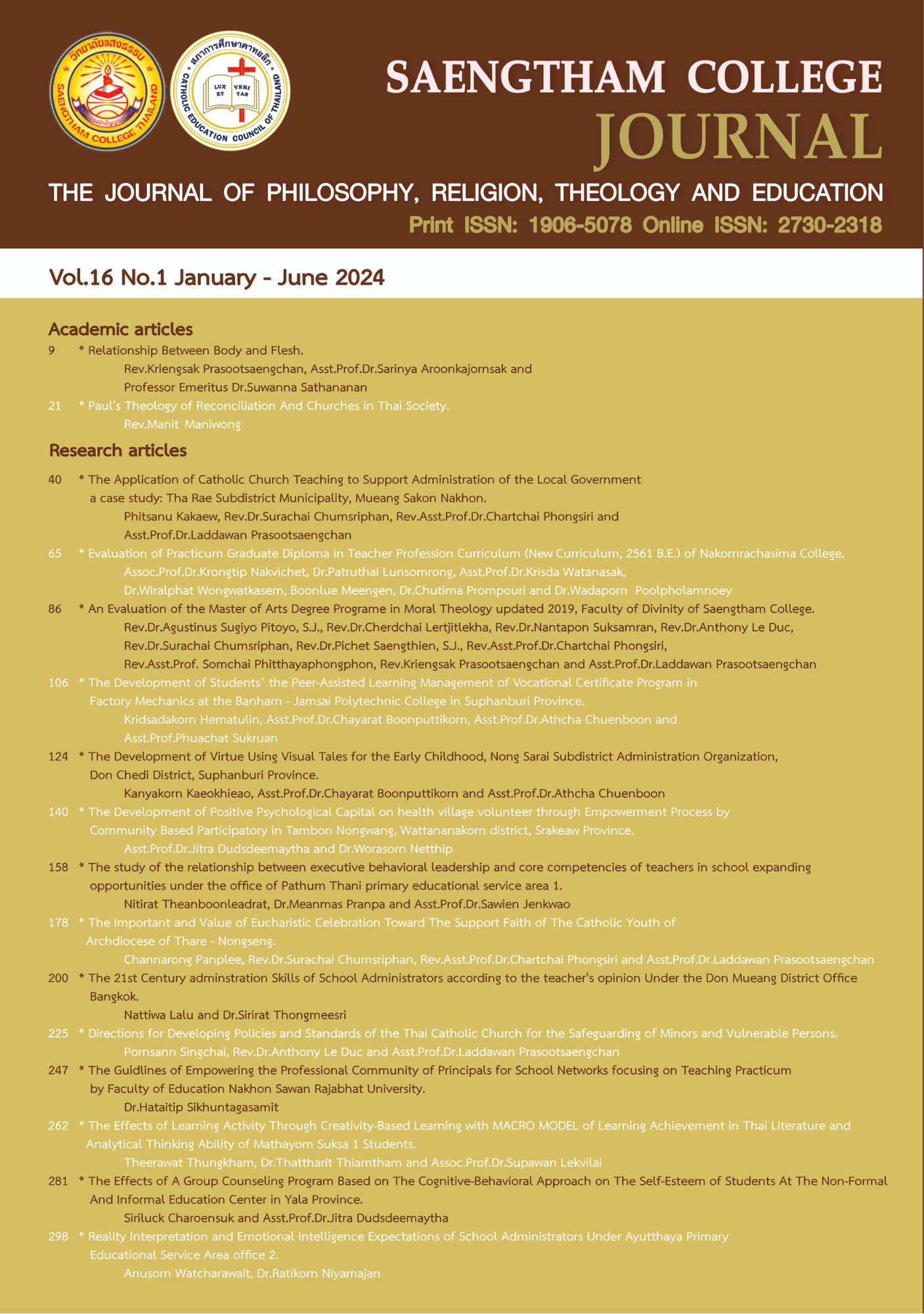The Development of Positive Psychological Capital on health village volunteer through Empowerment Process by Community Based Participatory in Tambon Nongwang, Wattananakorn district, Srakeaw Province
Main Article Content
Abstract
This research aimed to (1) Develop Positive Psychological Capital Model on health village volunteer through empowerment process by community based participatory model (2) Investigate Positive Psychological Capital of health village volunteer after activities participation of enhancement of health village volunteer through empowerment process by community based participatory. Using participatory action research by quality cycle, PAOR totally of 2 rounds in order to develop activities model and to intervene with sample group totally of 30 people. Comparing mean scores of Positive Psychological Capital before and after activities participation via t-Test Dependent, a statistical test. The result found that (1) The model of Positive Psychological Capital on health village volunteer through empowerment process by community based participatory composed of 3 main activities; Experiencing, Empowering, and Sharing. (2) After participating activities enhancement of health village volunteer through empowerment process by community based participatory, the sample group’s Positive Psychological Capital mean scores in total and by components were significantly higher than before participation.
Article Details

This work is licensed under a Creative Commons Attribution-NonCommercial-NoDerivatives 4.0 International License.
- The academic and research articles, as well as the content and opinions expressed therein, published in Saengtham College Journal are solely the responsibility of the respective author(s).
- Articles published in Saengtham College Journal are the property of Saengtham College. Reproduction, modification, or dissemination of all or part of the content in any form without written permission from Saengtham College is prohibited.
- Articles published in Saengtham College Journal are protected under the Copyright Act.
References
จิตรา ดุษฎีเมธา, สุเมษย์ หนกหลัง และสุธี สุนทรชัย (2564). การวิเคราะห์องค์ประกอบทุนทางจิตวิทยาเชิงบวกของอาสาสมัครสาธารณสุขประจำหมู่บ้าน อำเภอวัฒนานคร จังหวัดสระแก้ว. วารสารวิจัยและพัฒนาหลักสูตร, 11(2), 74-82.
จุฑามาศ วรรณศิลป์. (2561). คู่มือความรู้ สำหรับอาสาสมัครสาธารณสุขประจำหมู่บ้านเชี่ยวชาญสาขาสุขภาพจิตชุมชน เขตสุขภาพที่ 8. ศักดิ์ศรีอักษรการพิมพ์.
ชนมน สุขวงศ์ และรังสรรค์ โฉมยา. (2561). การวิเคราะห์องค์ประกอบเชิงยืนยันทุนทางจิตวิทยาเชิงบวกของนิสิตนักศึกษาในระดับอุดมศึกษา. สักทอง: วารสารมนุษยศาสตร์และสังคมศาสตร์ (สทมส), 24(3), 102-113.
ประภัสสร เกียรติลือเดช, อรวรรณ แก้วบุญชู และเพลินพิศ สุวรรณอำไพ. (2552). ปัจจัยที่มีความสัมพันธ์กับพฤติกรรมการเยี่ยมบ้านผู้ป่วยความดันโลหิตสูงที่ขาดนัดของอาสาสมัครสาธารณสุขประจำหมู่บ้าน. วารสารพยาบาลสาธารณสุข, 31(ฉบับพิเศษ), 1-12.
สุวิมล ว่องวาณิช และนงลักษณ์ วิรัชชัย. (2546). แนวทางการให้คำปรึกษาวิทยานิพนธ์. ศูนย์ตำราและเอกสารทางวิชาการ คณะครุศาสตร์ จุฬาลงกรณ์มหาวิทยลัย.
วรัญญา แดงสนิท และดวงกมล ไตรวิจิตรคุณ. (2557). ความสัมพันธ์เชิงสาเหตุระหว่างทุนทางจิตวิทยาเชิงบวกและความพึงพอใจในการปฏิบัติงานของครูโดยมีความยึดมั่นผูกพันในงานเป็นตัวแปรส่งผ่าน. วารสารอิเล็กทรอนิกส์ทางการศึกษา, 9(2), 307-319.
Abbas, M., Raja, U., Darr, W. & Bouckenooghe, D. (2014). “Combined effects of perceived politics and psychological capital on job satisfaction, turnover intentions, and performance”. Journal of Management, 40(7), 1813-1830.
Adam, R. (2003). Self-help, social work and empowerment. Palgrave Macmillan.
Carpenter, N., Lee, F & Male, D. (2023). A role for educational psychologists: using Planning Alternative Tomorrows with Hope (PATH) and participatory action research (PAR) to develop a Relationships and Sex Education (RSE) support group with staff in a special school. Educational Psychology in Practice, 39(1), 92-110.
Luthans, F., Avolio, B. J., Avey, J. B., & Norman, S. M. (2007). Positive psychological capital: measurement and relationship with performance and satisfaction. Personnel Psychology, 60(3), 541-572. https://doi.org/10.1111/j.1744-6570.2007.00083.x
MacDonald, C. (2012). Understanding participatory action research: Aqualitative research methodology option. Canadian Journal of Action Research, 13(2), 34-50.
Nakamura, J, & Csikszentmihalyi, M. (2009). Flow theory and research. In Lopaz, S.J., Snyder, C.R. (Eds.), Oxford handbook of positive psychology (pp. 195-206). Oxford University Press.
Ponciano, L. (2013). The voices of youth in foster care: A participant action research study. Action Research, 11(4), 322–336.
Paredes-Chi, A., Viga-de, A & María, D (2020). Participatory action research (PAR) and environmental education (EE): A Mexican experience with teachers from a primary rural school. Environmental Education Research, 26(11), 1578-1593.
Rand, K.L., & Cheavens, J.S. (2014). Hope theory. In Lopaz, S.J., Snyder, C.R. (Eds.), The Oxford handbook of positive psychology (pp. 323-334). WILEY Blackwell.
Salanova, M., & Llorens, S. (2014). Employee empowerment and engagement. In Day, A., Kelloway E., Hurrell J.Jr., (Eds.), Workplace well-being: How to build psychologically healthy workplaces (pp. 117-141) WILEY Blackwell.
Singh, S., & Mansi. (2009). Psychological capital as predictor of psychological well being. Journal of the Indian Academy of Applied Psychology, 35(2), 233-238.
Xanthopoulou, D., Bakker, A.B., Demerouti, E. and Schaufeli, W.B. (2011). A diary study on the happy worker: How job resources relate to positive emotions and personal resources". European Journal of Work and Organizational Psychology, 21(4), 489-517.
Xiufang, L. L & Burnside-Lawry, J. (2023). Using Participatory Action Research to Connect Research Agendas with User Need: A Crowdsourcing Case Study. Canadian Journal of Action Research, 23(3), 79-96
Youssef, C.M. & Luthans, F. (2007). Positive organizational behavior in the workplace: The impact of hope, optimism, and resilience. Journal of Management, 33(5), 774-800.


